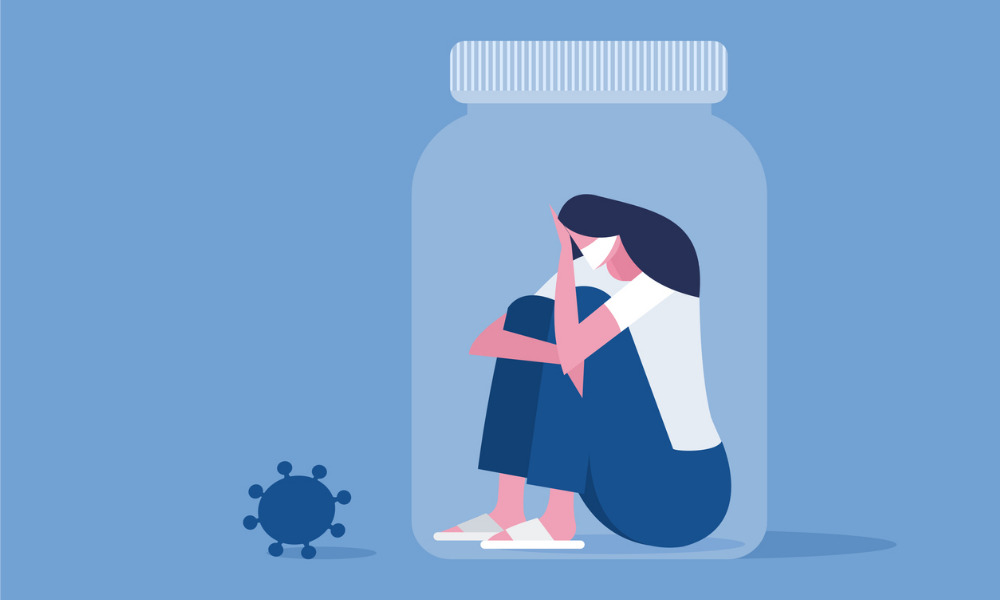Many Canadians concerned people letting guard down amid pandemic restrictions: survey

More than half (54 per cent) of Canadians say their mental health has suffered during the ongoing COVID-19 pandemic, and 50 per cent say they continue to feel that impact today.
In addition, nearly nine 10 (89 per cent) Canadians are worried that people are becoming impatient with lockdowns and will let their guard down, according to a survey from KPMG.
Meanwhile, 42 per cent believe that the health crisis the world is experiencing now will have a lasting impact on their mental health.
"More than a year of worrying about getting sick, stay-home restrictions, and job and economic challenges have taken a toll on Canadians' mental health," says Denis Trottier, chief mental health officer, KPMG in Canada. "With vaccinations ramping up, Canadians should be seeing the light at the end of the COVID-19 tunnel, but many are anxious that people are getting complacent and no longer exercising needed diligence to remain safe until the bulk of the population has been inoculated.
"We appear to be so close to the finish line in this ultra-marathon and now is not the time to stumble. More than ever, we need to be vigilant to protect our physical and mental health. This is the time to lean in."
More than two-thirds (68 per cent) of employed Canadians feel their employer has supported their mental health amid the COVID-19 pandemic, according to a recent report from Canada Life.
Gender, age differences
The survey reveals gender differences: More women (57 per cent) than men (50 per cent) say that their mental health has suffered during the pandemic. Fifty-three per cent of women (and 47 per cent men) said the pandemic has had an ongoing impact on their mental health, while 46 per cent of women (39 per cent men) believe the pandemic will have a lasting impact on their mental health.
And younger workers’ mental health has been put to the test more compared with older workers. More than seven in 10 (72 per cent) among 18- to 24-year-olds say their mental health has suffered and 66 per cent say the crisis has an ongoing impact on their mental health, finds the KPMG survey of 1,000 Canadians conducted in March.
These numbers drop the older the respondents get:
- 63 per cent and 62 per cent, respectively, for 25- to 34-year-olds
- 59 per cent and 61 per cent, respectively, for 35- to 44-year-olds
- 53 per cent and 47 per cent, respectively, for 45- to 54-year-olds
- 48 per cent and 43 per cent, respectively, for 55- to 64-year-olds
- 36 per cent and 31 per cent, respectively, for those aged 65 and up
The number also drops the older the respondents get: 60 per cent among 18- to 24-year-olds; 49 per cent among 25- to 34-year-olds; 52 per cent among 35- to 44-year-olds; 40 per cent among 45- to 54-year-olds; 33 per cent among 55- to 64-year-olds; and 28 per cent among those aged 65 and up.
Nearly half (47 per cent) of Canadian workers feel exhausted and 51 per cent feel stressed, compared with the global average of 39 per cent and 42 per cent, respectively, according to a report from Microsoft.
Not time to get careless
Getting fully vaccinated from COVID-19 does not mean that people can disregard safety measures implemented to prevent the spread of the virus, according to the Centres for Disease Control and Prevention (CDC).
“For now, if you’ve been fully vaccinated, you should still take steps to protect yourself and others in many situations, like wearing a mask, staying at least six feet apart from others, and avoiding crowds and poorly ventilated spaces,” it says. “Take these precautions whenever you are in public, gathering with unvaccinated people from more than one other household and visiting with an unvaccinated person who is at increased risk of severe illness or death from COVID-19 or who lives with a person at increased risk.”
People who have been fully vaccinated must also continue to avoid medium or large-sized gatherings, watch out for symptoms of COVID-19 and follow safety guidance in the workplace.
Employers are pretty divided on whether vaccines should be mandated for work.




